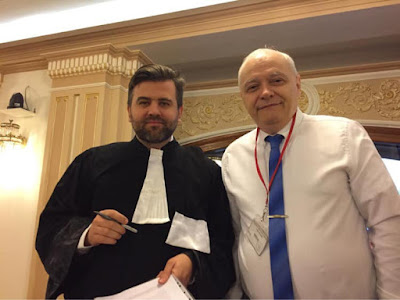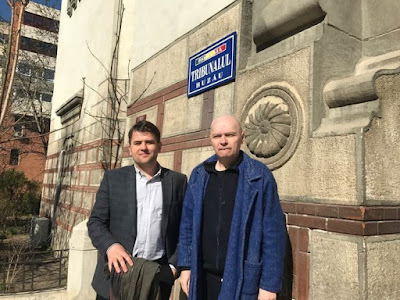Am scris acest articol pentru publicatia Jurnal Social a Consiliului National al Dizabilitatii din Romania, cu ocazia Zilei europene a vietii independente, celebrate pe 5 mai 2019.
Ziua europeană a vieții independente, sărbătorită în fiecare an pe 5 mai, oferă persoanelor cu dizabilități un prilej de a revendica o societate mai bună, care le respectă autonomia, care oferă oportunități egale și care le asigură accesul la aceleasi opțiuni și la decizii proprii în viața de zi cu zi. Viața independentă presupune un mediu construit accesibil, accesul la tehnologii asistive, accesul la asistență personală și la servicii de sprijin localizate în comunitate. Această viziune generoasă vine în contrast cu realitatea cotidiană din România, caracterizată de precaritate socio-economică, dependență, segregare, excluziune, prejudecăți și stigmă.
Faptul că persoanele cu dizabilități duc o viață foarte grea este o afirmație banalizată prin repetare. Dincolo de generalități și sloganuri, avem niște oameni mai degrabă invizibili și familiile lor. Multe persoane cu dizabilități, de ordinul sutelor de mii, trăiesc izolate în comunitate. Ele sunt mai sărace decât restul populației și multe nu au un loc de munca. Persoanele cu dizabilități sunte adesea blocate într-o relație de depedență față de Stat (care le acordă unele beneficii modice) și față de familie (ca singură sursă de suport). Lipsa accesibilității mediului construit completează acest peisaj deprimant. Pe de altă parte, avem persoanele cu dizabilități din instituții, de ordinul zecilor de mii. Acolo ajung cei care nu respectă profilul mai sus amintit, de obicei pentru ca au pierdut într-un fel sau altul sprijinul familial sau din cauza unui șoc economic în contextul regimului de austeritate și degradare economică de după căderea comunismului. Instituționalizarea este în vasta majoritate a cazurilor un drum cu sens unic. Deși pretextul instituțiilor este caritabil si asistențial, în fapt ele au menirea de a controla o gamă largă de indivizi cu trăsături indezirabile din diverse motive. Sistemul instituțional reproduce si consolidează stereotipurile negative la adresa persoanelor cu dizabilități, previne crearea unor alternative efective de sprijin în comunitate și este caracterizat de dezechilibre vaste de putere între ‘beneficiari’ și angajații statului, fapt ce crează condiții prielnice pentru săvârșirea și disimularea unor abuzuri grave.
Noțiuni generoase precum viața independentă, încorporate de altfel în Convenția ONU pentru drepturile persoanelor cu dizabilități, par un alt exemplu de auto-iluzionare si escapism, o beție cu apă rece. Avem doar și noi legile noastre care garantează drepturi fundamentale pentru toți și care interzic abuzurile, dar care co-există cu o viață segregată incepând din copilărie (în școli speciale) și până la moarte (în instituții rezidențiale). Legile noastre par mai mult o perdea de fum, menită să ascundă și să cosmetizeze precaritatea și lipsa de speranță a vieții de zi cu zi. Deși, date fiind aceste condiții vitrege, fatalismul și renunțarea sunt de înțeles, e bine de știut totuși că există destui care nu au depus armele. Văd două posibile strategii pentru ieșirea din pasivitate și dependență: activismul juridic și implicarea politică.
În ceea ce privește activismul juridic, există unele condiții favorabile. Avem pe de o parte mai-sus menționata Convenție pentru Drepturile Persoanelor cu Dizabilități, adoptată cu participarea persoanelor cu dizabilități și ratificată universal, care articulează aspirația la participare și incluziune pentru toți, o unitate de măsură care ne permite să evaluăm situația actuală si direcția în care ne îndreptam, care conferă putere simbolica și suport moral. Avem mai apoi acces la un sistem de instanțe rezonabil de independente și competente, care trebuie învățate să înțeleagă experiența persoanelor cu dizabilități și să acorde protecție efectivă împotriva discriminării. Problema cu pasivitatea este că transformă predicția privind inutilitatea drepturilor în realitate – dacă nu te lupți pentru drepuri, nimeni nu va veni să ți le ofere pe un platou, sau cel puțin nu în Romania.
În ciuda aparenței unei populații amorfe și supuse, există multe persoane curajoase și cu spirit de sacrificiu care se luptă de ani întregi cu sistemul. Ele trebuie cunoscute mai bine și celebrate pentru munca de pionierat pe care o fac. Mamele (singure) de copii cu dizabilități, care fac totul de la cărat copilul în cârcă la școală, supravegheat în timpul orelor, agonisit traiul de zi cu zi, făcut munca de predare acasă, mers în instanțe judecătorești pentru lupte de ani întregi cu autorităţile statului. Bărbatul în scaun rulant care dorește să studieze, dar care ajunge până la CEDO pentru a se plânge de lipsa de accesibilitate a universităților. Bărbatul cu schizofrenie închis pe nedrept timp de 17 ani într-un spital de psihiatrie, care merge în instanță an de an pentru a-și revendica drepturile, care ajunge până la CEDO și este pus în libertate. Bărbatul în scaun rulant dat afară de la servici atunci când biroul său este mutat la etajul unei clădiri inaccesibile, și care constată ca instanțele sunt de asemenea inaccesibile. Copilul cu dizabilități de clasa a V-a hărțuit și insultat de profesori și alți copii timp de luni întregi, ai cărui parinți merg în instanță și obțin condamnarea vinovaților.
Implicarea politică, temă predilectă a organizațiilor europene din zona dizabilității în acest an electoral, poate de asemenea reprezenta o soluție. Conform statisticilor oficiale, avem aproximativ opt sute de mii de persoane cu dizabilități. Dacă includem și rudele apropiate, ajungem la cifra respectabilă de peste un milion de votanți direct interesați de politicile statului în domeniul dizabilității. Trebuie însă să coborâm cu picioarele pe pământ. Obstacolele structurale menționate mai sus limitează în egală măsură participarea in viața publică. Impedimente de ordin practic sau juridic precum lipsa accesibilității, lipsa informației în format accesibil, procedura punerii sub interdicție sau izolarea în instituții, împiedică adesea exercitarea dreptului la vot. În plus, persoanele cu dizabilitati, lipsite de informație și cu un nivel mediu de educație mai scăzut, sunt susceptibile cântecelor de sirenă populiste din partea unor partide care pledează de fapt pentru politici care le defavorizează, cum ar fi cele de reducere a statului. Și aici avem de a face cu un cerc vicios, căci lipsa de participare transmite ideea politicienilor că interesele persoanelor cu dizabilități nu sunt demne de luat în considerare, sau că acestea sunt incapabile de a-și exercita drepturile cetățenești. Este important ca persoanele cu dizabilități să fie mai exigente cu politicienii, prioritizând drepturile proprii atunci cand evaluează ofertele electorale.
Și în această privință există motive de optimism, în ultimul timp făcându-și apariția pe scena politică unele inițiative care prioritizează explicit drepturile persoanelor cu dizabilități. Demos este un partid social democrat nou înființat, care își asumămisiunea politicăde a lupta împotriva inegalităților sociale și pentru respectarea drepturilor fundamentale pentru toți. Dizabilitatea este inclusă transversal în toate documentele, politicile și luările de poziție ale partidului, dublat de o înțelegere nuanțată a resorturilor social-economice care împing persoanele cu dizabilități spre marginea societății. Demos își propune sărecruteze în mod activ persoane din categorii vulnerabile si dezavantajate în structurile sale, deja numărând activiști cu dizabilitățidiverse din comunitate, dar și din instituții, printre membri si simpatizanți. În plus, campania candidatei independente la alegerile pentru Parlamentul European, Mădălina Turza, care a reușit performanța remarcabilă de a aduna zeci de mii de semnături în sprijinul unei platforme dedicate exclusiv drepturilor copiilor cu dizabilitățila participare si incluziune socială.
Constantin Cojocariu este avocat si activist Demos. Ajută persoanele cu dizabilități de 15 ani să-și reclame drepturile în instanțele din România și din Europa.



